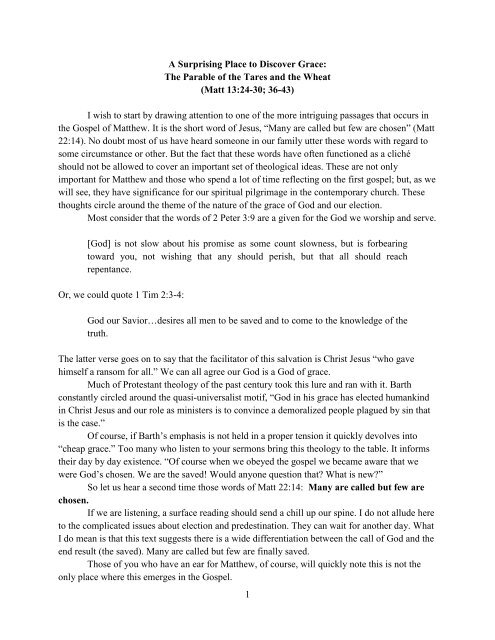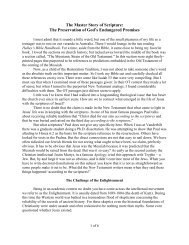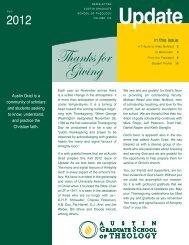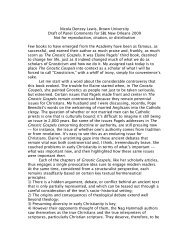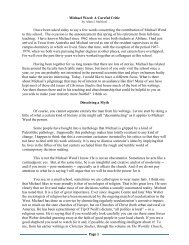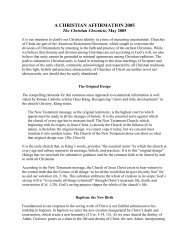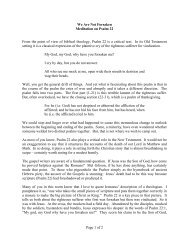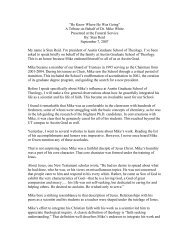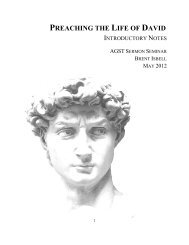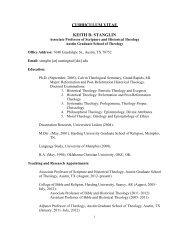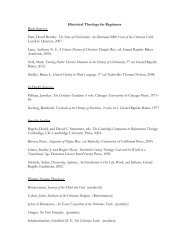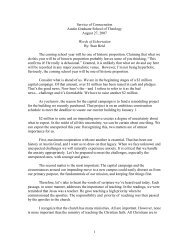Create successful ePaper yourself
Turn your PDF publications into a flip-book with our unique Google optimized e-Paper software.
A Surprising Place to Discover Grace:<br />
<strong>The</strong> <strong>Parable</strong> <strong>of</strong> <strong>the</strong> <strong>Tares</strong> <strong>and</strong> <strong>the</strong> <strong>Wheat</strong><br />
(Matt 13:24-30; 36-43)<br />
I wish to start by drawing attention to one <strong>of</strong> <strong>the</strong> more intriguing passages that occurs in<br />
<strong>the</strong> Gospel <strong>of</strong> Mat<strong>the</strong>w. It is <strong>the</strong> short word <strong>of</strong> Jesus, “Many are called but few are chosen” (Matt<br />
22:14). No doubt most <strong>of</strong> us have heard someone in our family utter <strong>the</strong>se words with regard to<br />
some circumstance or o<strong>the</strong>r. But <strong>the</strong> fact that <strong>the</strong>se words have <strong>of</strong>ten functioned as a cliché<br />
should not be allowed to cover an important set <strong>of</strong> <strong>the</strong>ological ideas. <strong>The</strong>se are not only<br />
important for Mat<strong>the</strong>w <strong>and</strong> those who spend a lot <strong>of</strong> time reflecting on <strong>the</strong> first gospel; but, as we<br />
will see, <strong>the</strong>y have significance for our spiritual pilgrimage in <strong>the</strong> contemporary church. <strong>The</strong>se<br />
thoughts circle around <strong>the</strong> <strong>the</strong>me <strong>of</strong> <strong>the</strong> nature <strong>of</strong> <strong>the</strong> grace <strong>of</strong> God <strong>and</strong> our election.<br />
Most consider that <strong>the</strong> words <strong>of</strong> 2 Peter 3:9 are a given for <strong>the</strong> God we worship <strong>and</strong> serve.<br />
[God] is not slow about his promise as some count slowness, but is forbearing<br />
toward you, not wishing that any should perish, but that all should reach<br />
repentance.<br />
Or, we could quote 1 Tim 2:3-4:<br />
God our Savior…desires all men to be saved <strong>and</strong> to come to <strong>the</strong> knowledge <strong>of</strong> <strong>the</strong><br />
truth.<br />
<strong>The</strong> latter verse goes on to say that <strong>the</strong> facilitator <strong>of</strong> this salvation is Christ Jesus “who gave<br />
himself a ransom for all.” We can all agree our God is a God <strong>of</strong> grace.<br />
Much <strong>of</strong> Protestant <strong>the</strong>ology <strong>of</strong> <strong>the</strong> past century took this lure <strong>and</strong> ran with it. Barth<br />
constantly circled around <strong>the</strong> quasi-universalist motif, “God in his grace has elected humankind<br />
in Christ Jesus <strong>and</strong> our role as ministers is to convince a demoralized people plagued by sin that<br />
is <strong>the</strong> case.”<br />
Of course, if Barth’s emphasis is not held in a proper tension it quickly devolves into<br />
“cheap grace.” Too many who listen to your sermons bring this <strong>the</strong>ology to <strong>the</strong> table. It informs<br />
<strong>the</strong>ir day by day existence. “Of course when we obeyed <strong>the</strong> gospel we became aware that we<br />
were God’s chosen. We are <strong>the</strong> saved! Would anyone question that? What is new?”<br />
So let us hear a second time those words <strong>of</strong> Matt 22:14: Many are called but few are<br />
chosen.<br />
If we are listening, a surface reading should send a chill up our spine. I do not allude here<br />
to <strong>the</strong> complicated issues about election <strong>and</strong> predestination. <strong>The</strong>y can wait for ano<strong>the</strong>r day. What<br />
I do mean is that this text suggests <strong>the</strong>re is a wide differentiation between <strong>the</strong> call <strong>of</strong> God <strong>and</strong> <strong>the</strong><br />
end result (<strong>the</strong> saved). Many are called but few are finally saved.<br />
Those <strong>of</strong> you who have an ear for Mat<strong>the</strong>w, <strong>of</strong> course, will quickly note this is not <strong>the</strong><br />
only place where this emerges in <strong>the</strong> Gospel.<br />
1
Enter by <strong>the</strong> narrow gate; for <strong>the</strong> gate is wide – <strong>and</strong> <strong>the</strong> way is easy that leads to<br />
destruction, <strong>and</strong> those who enter by it are many. For <strong>the</strong> gate is narrow <strong>and</strong> <strong>the</strong><br />
way is marked by afflictions that leads to life, <strong>and</strong> those that find it are few (Matt<br />
7:13-14).<br />
As unpopular as it may seem, <strong>the</strong>se texts suggest that not all <strong>of</strong> us who reckon that we<br />
operate within <strong>the</strong> sphere <strong>of</strong> <strong>the</strong> kingdom will make it at <strong>the</strong> final roll call.<br />
But let us take a closer look at Matt 22:14. <strong>The</strong> exegetes have been concerned with this<br />
text for a long time. <strong>The</strong> late Ben Meyer produced a very insightful article on its exegetical<br />
history. He determined (correctly in my view) that it was not about election in <strong>the</strong> way<br />
magisterial <strong>the</strong>ologians <strong>of</strong> <strong>the</strong> last few centuries have dealt with <strong>the</strong> topic. <strong>The</strong> verse is simply a<br />
remembrance <strong>of</strong> Jesus’ response to <strong>the</strong> results <strong>of</strong> his preaching in Israel. Its overall point is quite<br />
straightforward. It is not enough to be called. One must respond faithfully. Grammatically, <strong>the</strong><br />
saying is a special kind <strong>of</strong> comparative construction.<br />
<strong>The</strong> more numerous (i.e. all Israel) are <strong>the</strong> ones called to repentance. <strong>The</strong> less<br />
numerous (i.e. those who faithfully respond to Jesus’ call) are those who will<br />
attain salvation.<br />
Read this way, it is a fitting conclusion to <strong>the</strong> two parables in Matt 22:1-13. In <strong>the</strong> first parable<br />
<strong>the</strong> people made all kinds <strong>of</strong> excuses; <strong>the</strong>y did everything to avoid active responsible acceptance<br />
<strong>of</strong> <strong>the</strong> invitation to <strong>the</strong> king’s marriage feast. In <strong>the</strong> second instance <strong>the</strong> parable highlights <strong>the</strong><br />
response to <strong>the</strong> one who did not bo<strong>the</strong>r to bring his wedding garment <strong>and</strong> thus also showed<br />
contempt toward <strong>the</strong> king. In both cases lack <strong>of</strong> faithfulness was <strong>the</strong> deciding factor in<br />
differentiating between <strong>the</strong> called <strong>and</strong> <strong>the</strong> chosen.<br />
A Troubling Issue<br />
Although this opening aside on Matt 22:14 may take us away from some <strong>of</strong> <strong>the</strong> issues<br />
raised by <strong>the</strong> new Calvinists this saying <strong>of</strong> Jesus <strong>and</strong> <strong>the</strong> parable that will be our focus today (<strong>The</strong><br />
<strong>Tares</strong> <strong>and</strong> <strong>the</strong> <strong>Wheat</strong>) never<strong>the</strong>less still have <strong>the</strong> capacity to make us somewhat uneasy. <strong>The</strong>y<br />
seem to be suggesting that salvation may not be a totally settled issue. Does Mat<strong>the</strong>w really<br />
mean to say that our personal salvation is not settled by our conversion followed up by living<br />
within conventional fences? Is <strong>the</strong>re a possibility that something could go awry at <strong>the</strong> very end<br />
(i.e. <strong>the</strong> judgment)? I suggest that, carefully construed, to many members <strong>of</strong> “little complacent<br />
churchs,” this could be slightly troubling.<br />
So <strong>of</strong>ten when we think <strong>of</strong> Jesus’ parables we see <strong>the</strong>m as those in Luke 15, as metaphors<br />
for unadulterated joy as <strong>the</strong> lost or sinner is welcomed home. But <strong>the</strong>re are several parables in<br />
Mat<strong>the</strong>w, mostly peculiar to him that indicate <strong>the</strong>re may be some surprises at <strong>the</strong> last day. <strong>The</strong>se,<br />
most certainly, capture our attention. So a brief series on what I call peculiar Mat<strong>the</strong>an end-times<br />
2
parables may well have <strong>the</strong> effect <strong>of</strong> a cold shower. Yet <strong>the</strong>y have value. <strong>The</strong>y can wake us up<br />
from drifting into spiritual listlessness.<br />
Of course, preaching a series <strong>of</strong> sermons on parables that involves a lot <strong>of</strong> talk about <strong>the</strong><br />
judgment may seem to be swimming against <strong>the</strong> tide. Mat<strong>the</strong>w represents <strong>the</strong>se sermons as<br />
coming from Jesus; but even that causes some folks difficulties. As I was involved in <strong>the</strong><br />
preparation for my presentation <strong>of</strong> this series, word came across my computer that in <strong>the</strong> past<br />
several years more than 100,000 people have disappeared from <strong>the</strong> pews <strong>of</strong> Churches <strong>of</strong> Christ in<br />
America. And we all know that a large number <strong>of</strong> <strong>the</strong>m are in <strong>the</strong> under-thirty population. A<br />
couple <strong>of</strong> days after I received <strong>the</strong> news about our alarming attendance decline, I came across<br />
ano<strong>the</strong>r widely distributed report that young adults are leaving churches <strong>of</strong> all kinds in droves<br />
because <strong>the</strong>y perceive organized religion as too judgmental. <strong>The</strong> report indicated that if we want<br />
to keep young people coming we had better stay away anything that has <strong>the</strong> whiff <strong>of</strong> being<br />
judgmental. Thus <strong>the</strong>se texts <strong>of</strong>fer a challenge. Most churches <strong>of</strong> Christ do not follow a<br />
lectionary. So we don’t have to preach <strong>the</strong>se parables. But, <strong>the</strong> last time I checked, <strong>the</strong>se were in<br />
<strong>the</strong> canon which to us is <strong>the</strong> whole counsel <strong>of</strong> God. Thus, I suggest, despite <strong>the</strong> culture, perhaps<br />
with due caution, it may still be worthwhile to take a look at what <strong>the</strong>y have to say.<br />
<strong>The</strong>re is one o<strong>the</strong>r factor that just may entice a congregation to have some interest in<br />
<strong>the</strong>se texts. I call it ‘fascination with <strong>the</strong> unknown.’ What will it be like when we approach <strong>the</strong><br />
o<strong>the</strong>r side? When we have to appear at <strong>the</strong> last day? Some years ago I was sitting with a group <strong>of</strong><br />
friends having a meal with <strong>the</strong> great Jewish scholar <strong>and</strong> English Jurist David Daube. Someone<br />
asked about what spiked his interest, as an observant Jew, to take up <strong>and</strong> study seriously<br />
Christian texts. He was only more than happy to reply with a story about how it all got started.<br />
Apparently before Hitler, he lived as a child in one <strong>of</strong> <strong>the</strong> innumerable small villages in<br />
Germany that had a large Jewish population. <strong>The</strong>re were only two religious communities in <strong>the</strong><br />
village: a synagogue <strong>and</strong> a Catholic church. <strong>The</strong> rabbi had told <strong>the</strong> young people many times that<br />
it ever <strong>the</strong>y were near <strong>the</strong> Catholic church an evil spirit would get <strong>the</strong>m <strong>and</strong> terrible things would<br />
happen. Well, you can about guess <strong>the</strong> rest. One night Daube <strong>and</strong> his friend were out after dark.<br />
<strong>The</strong>y saw a light in <strong>the</strong> Catholic church. Inevitably <strong>the</strong>y were attracted to see what was taking<br />
place. Outside one <strong>of</strong> <strong>the</strong> windows Daube’s friend hoisted him up on his shoulders so that he<br />
could peer inside to see what was taking place. Absolutely fascinated, Daube watched<br />
spellbound. <strong>The</strong> priest, alone, in full clerical regalia, was engaged in <strong>the</strong> rite <strong>of</strong> <strong>the</strong> mass. After<br />
his friend let him down <strong>the</strong>y returned home that night in right mind to live ano<strong>the</strong>r day. Now<br />
Daube was hooked. He could do nothing else but unpack <strong>the</strong> mystery <strong>of</strong> this o<strong>the</strong>r world he had<br />
encountered. He wanted to know what was behind this rite. It seemed to him to be so suffused<br />
with an encounter with <strong>the</strong> inexplicable. For some reason or o<strong>the</strong>r <strong>the</strong>se parables speaking about<br />
<strong>the</strong> o<strong>the</strong>r world, rightly h<strong>and</strong>led, may have a similar resonance.<br />
When <strong>the</strong> Son <strong>of</strong> Man comes in his glory, <strong>and</strong> all <strong>the</strong> angels with him, <strong>the</strong>n he will<br />
sit on his glorious throne. Before him will be ga<strong>the</strong>red all <strong>the</strong> peoples…<br />
3
Who cannot be fascinated by such language? It has a wonderful capacity to draw us into its orbit.<br />
Inevitably we are forced to ask, “Where do I st<strong>and</strong> in this story?” This is <strong>the</strong> perspective I would<br />
like for you to cultivate with your congregation as you seek to lead <strong>the</strong>m on this search <strong>of</strong><br />
spiritual discovery. So let us now turn to <strong>the</strong> first <strong>of</strong> <strong>the</strong>se parables, <strong>the</strong> <strong>Tares</strong> among <strong>the</strong> <strong>Wheat</strong><br />
(13:24-30; 36-43).<br />
Locating <strong>the</strong> <strong>Parable</strong><br />
<strong>The</strong> <strong>Parable</strong> <strong>of</strong> <strong>the</strong> <strong>Tares</strong> (is it darnel, weeds, wild oats or whatever?) is a crucial part <strong>of</strong><br />
Mat<strong>the</strong>w’s famous parable unit in Mat<strong>the</strong>w 13. Aside from <strong>the</strong> <strong>Parable</strong> <strong>of</strong> <strong>the</strong> Sower which leads<br />
<strong>of</strong>f this collection <strong>of</strong> seven parables it is <strong>the</strong> only one given an extensive interpretive elaboration<br />
in this grouping. This parallel with <strong>the</strong> <strong>Parable</strong> <strong>of</strong> <strong>the</strong> Sower is important. It reminds us that <strong>the</strong><br />
<strong>Parable</strong> <strong>of</strong> <strong>the</strong> <strong>Tares</strong> must be read in <strong>the</strong> context <strong>of</strong> <strong>the</strong> entire parable chapter in Mat<strong>the</strong>w 13.<br />
My friend Lamar Cope points out that after Jesus narrates <strong>the</strong> <strong>Parable</strong> <strong>of</strong> <strong>the</strong> Sower in<br />
13:2-8 it is followed by a brief exhortation in 13:9:<br />
He who has ears (to hear) let him hear.<br />
Cope points out that this same wording occurs in 13:43 at <strong>the</strong> end <strong>of</strong> <strong>the</strong> parable <strong>of</strong> <strong>the</strong> <strong>Tares</strong>.<br />
Thus ano<strong>the</strong>r connection is made between <strong>the</strong> two parables. Mat<strong>the</strong>w’s point is that <strong>the</strong> parables<br />
are capable <strong>of</strong> being understood. <strong>The</strong> question <strong>of</strong> <strong>the</strong> disciples in 13:10 querying why <strong>the</strong>n does<br />
Jesus speak in parables (riddles) is, without doubt, an interesting request. It gets a direct answer<br />
in verses 10-17. Presuming <strong>the</strong> common process <strong>of</strong> exegesis in Jewish communities at that time,<br />
<strong>the</strong>se verses are saying that when <strong>the</strong> leader <strong>of</strong> <strong>the</strong> community unpacks a biblical text, instructed<br />
by <strong>the</strong> spirit, its deep secrets are made available by that teacher or his close followers. Although<br />
<strong>the</strong> text here is a parable <strong>and</strong> <strong>the</strong> teacher (Jesus) is unpacking its secrets (v. 11) it is <strong>the</strong>n<br />
interesting to note that <strong>the</strong> statement<br />
Who have eyes to see, but see not?<br />
Who have ears to hear, but hear not?<br />
is found in a biblical text: Ezek 13:2. <strong>The</strong>re <strong>the</strong> prophet is speaking against some in <strong>the</strong> house <strong>of</strong><br />
Israel: <strong>the</strong> community <strong>of</strong> faith. This will be pertinent as <strong>the</strong> <strong>Parable</strong> <strong>of</strong> <strong>the</strong> <strong>Tares</strong> unfolds. Israel<br />
has <strong>the</strong> capacity to hear, see <strong>and</strong> underst<strong>and</strong>. But as Isaiah says (Matt 13:14-15), those outside<br />
<strong>the</strong> core community <strong>of</strong> righteous ones are beset with confusion. Thus, only those in relationship<br />
with <strong>the</strong> teacher can fully underst<strong>and</strong>.<br />
With regard to <strong>the</strong> <strong>Parable</strong> <strong>of</strong> <strong>the</strong> Sower, <strong>the</strong> interpretation shows that it is really a parable<br />
about <strong>the</strong> outcome <strong>of</strong> <strong>the</strong> kingdom <strong>of</strong> <strong>the</strong> Son <strong>of</strong> Man. To <strong>the</strong> special few, <strong>the</strong> meaning <strong>of</strong> <strong>the</strong><br />
parable is clear. <strong>The</strong> seed is “<strong>the</strong> word <strong>of</strong> <strong>the</strong> kingdom.” Despite <strong>the</strong> different soils <strong>the</strong>re are only<br />
two kinds <strong>of</strong> people: those who hear <strong>and</strong> underst<strong>and</strong> (v. 23) <strong>and</strong> those who do not (vs. 19, 20,<br />
22). <strong>The</strong> critical point is that <strong>the</strong> parable anticipates <strong>the</strong> eschaton. As <strong>the</strong> later parables point out,<br />
4
that is when it will be all sorted out. Those who underst<strong>and</strong> <strong>the</strong> secrets that <strong>the</strong> teacher unfolds<br />
<strong>and</strong> act appropriately by providing much fruit in <strong>the</strong>ir lives <strong>of</strong> faithfulness will be vindicated.<br />
Those who do not will be separated on <strong>the</strong> last day. I would contend that if you do preach <strong>the</strong><br />
<strong>Parable</strong> <strong>of</strong> <strong>the</strong> Sower in this series, you plan to preach it in <strong>the</strong> entirety <strong>of</strong> Matt 13.<br />
<strong>The</strong> <strong>Parable</strong> <strong>of</strong> <strong>the</strong> <strong>Wheat</strong> <strong>and</strong> <strong>the</strong> <strong>Tares</strong>:<br />
An Initial Interpretation<br />
This emphasis on being made privy to <strong>the</strong> secrets <strong>of</strong> what is emerging with <strong>the</strong> coming <strong>of</strong><br />
<strong>the</strong> kingdom thus brings us to <strong>the</strong> <strong>Parable</strong> <strong>of</strong> <strong>the</strong> <strong>Wheat</strong> <strong>and</strong> <strong>the</strong> <strong>Tares</strong>; as noted, this is <strong>the</strong> only<br />
o<strong>the</strong>r parable in Mat<strong>the</strong>w’s parable collection aside from <strong>the</strong> Sower that has an extended<br />
interpretation. Even though it clearly has an emphasis on <strong>the</strong> importance <strong>of</strong> <strong>the</strong> end-time, <strong>the</strong>re<br />
are still some major views about where <strong>the</strong> exact emphasis falls in this parable. Thus a closer<br />
look is needed to determine what is going on here.<br />
Many commentators argue that <strong>the</strong> meaning centers on <strong>the</strong> underst<strong>and</strong>ing <strong>of</strong> <strong>the</strong> field in<br />
which <strong>the</strong> seed is sown. Both <strong>the</strong> Son <strong>of</strong> Man <strong>and</strong> <strong>the</strong> devil sow respectively <strong>the</strong>ir seed in <strong>the</strong><br />
same field. Mat<strong>the</strong>w 13:38 states that <strong>the</strong> field is “<strong>the</strong> world.” But what is that? In an ordinary<br />
reading <strong>of</strong> <strong>the</strong> text many conclude that <strong>the</strong> parable is saying that <strong>the</strong> work <strong>of</strong> <strong>the</strong> Son <strong>of</strong> Man,<br />
continuing on with his disciples, will have a universal impact. This seems to fit Matt 28:19. And<br />
likewise, since <strong>the</strong> work <strong>of</strong> <strong>the</strong> devil <strong>and</strong> his agents certainly covers <strong>the</strong> entire realm, this reading<br />
also supports <strong>the</strong> view that “<strong>the</strong> world” really is a reference to a process that involves every last<br />
person in this vast domain. In short, this is a parable about <strong>the</strong> way it will be for everyone in <strong>the</strong><br />
whole world.<br />
If this is <strong>the</strong> reading, as some have noted, <strong>the</strong> point <strong>of</strong> <strong>the</strong> parable is that <strong>the</strong> kingdom is<br />
not especially significant in <strong>the</strong> present age. For <strong>the</strong> time being we are to take comfort in <strong>the</strong><br />
knowledge that although <strong>the</strong> kingdom has been inaugurated we now know why God’s rule is not<br />
fully evident – <strong>the</strong> devil is allowed to continue his work. <strong>The</strong> kingdom will only fully emerge<br />
after <strong>the</strong> final sorting out at <strong>the</strong> last judgment.<br />
Yet, although this interpretation is popular in many circles it has serious problems. In a<br />
delightful phrase McIver points out that this reading “involves a truism too trivial to even be<br />
described as a cliché. <strong>The</strong> kingdom is here but it is not here.” Is that all <strong>the</strong>re is? On <strong>the</strong> o<strong>the</strong>r<br />
h<strong>and</strong>, if our analysis <strong>of</strong> Mat<strong>the</strong>w 13 is on target, Mat<strong>the</strong>w has set this parable up as something<br />
that brings significant insight <strong>and</strong> underst<strong>and</strong>ing that is <strong>of</strong> use for <strong>the</strong> present believer. That<br />
would be something far more than just <strong>the</strong> point that God’s rule is still not universalized. Turn on<br />
your televisions sets <strong>and</strong> we can see that is apparent – in less than 15 minutes.<br />
Ano<strong>the</strong>r View <strong>of</strong> <strong>the</strong> <strong>Parable</strong><br />
I have <strong>of</strong>ten noticed that <strong>the</strong> key to getting <strong>the</strong> point <strong>of</strong> a parable <strong>of</strong> Jesus is to look<br />
around <strong>and</strong> fix one’s eyes on something unusual about <strong>the</strong> action that is being described in <strong>the</strong><br />
parable. For instance, in <strong>the</strong> parable <strong>of</strong> <strong>the</strong> widow losing <strong>the</strong> coin in Lk 15:8-10 we learn that she<br />
5
turns her house upside down in order to find something that was lost. This is a simple description<br />
that would almost go unnoticed by many men. But most women would do about anything in <strong>the</strong><br />
world ra<strong>the</strong>r than mess up <strong>the</strong>ir house! That may be just <strong>the</strong> point! <strong>The</strong> woman did this because<br />
<strong>the</strong> coin was so precious that she would tolerate total disorder to get it. If <strong>the</strong> woman would do<br />
this for a coin, I think that when <strong>the</strong> lost is found <strong>the</strong>re is all <strong>the</strong> more joy. Likewise with <strong>the</strong><br />
<strong>Parable</strong> <strong>of</strong> <strong>the</strong> <strong>Tares</strong>. In reading this parable I notice again something unusual. <strong>The</strong> householder<br />
does not allow <strong>the</strong> workers to remove <strong>the</strong> tares or weeds from <strong>the</strong> good plants. Good <strong>and</strong> bad will<br />
just have to exist toge<strong>the</strong>r until <strong>the</strong> end.<br />
This strikes me as odd – especially for someone who grew up in <strong>the</strong> wheat country <strong>of</strong><br />
Australia. I realize that in a large field <strong>of</strong> wheat it is impossible to go out <strong>and</strong> remove plants<br />
wholesale without tearing up some <strong>of</strong> <strong>the</strong> good ones. But I think we have overdone <strong>the</strong>se<br />
difficulties. In ancient Palestine <strong>the</strong> fields were small <strong>and</strong> <strong>the</strong>re seemed to be a lot <strong>of</strong> workers<br />
around to clean up <strong>the</strong> field. <strong>The</strong>y could have done <strong>the</strong> job on that field! As a teenager on my<br />
fa<strong>the</strong>r’s dry l<strong>and</strong> property I was <strong>of</strong>ten sent out to chip out weeds <strong>and</strong> thus save moisture for <strong>the</strong><br />
good plants. As I read this parable I can hardly hear my fa<strong>the</strong>r saying, “Don’t bo<strong>the</strong>r with that.<br />
Let everything go until <strong>the</strong> harvest.” As I said, this is odd. It is not <strong>the</strong> usual thing to do. I think<br />
<strong>the</strong> servants found this unusual as well, <strong>and</strong> probably <strong>the</strong> ancient readers would agree.<br />
But in thinking <strong>and</strong> searching for insight about this I was reminded <strong>of</strong> Jesus’ words<br />
earlier in this chapter to <strong>the</strong> disciples: to paraphrase, “pay attention in order to see, hear <strong>and</strong><br />
underst<strong>and</strong>.” And if we are paying attention <strong>the</strong>n we begin to see, perhaps to our surprise, an<br />
important word <strong>of</strong> grace emerging. To our surprise – Yes! Because <strong>the</strong>re is a lot about <strong>the</strong><br />
judgment in this parable.<br />
But grace? Here? Yes, because what is really being discussed, if we are hearing, is not so<br />
much a lesson on <strong>the</strong> sifting out process at <strong>the</strong> end <strong>of</strong> <strong>the</strong> age (<strong>the</strong> weeds will be burned); but a<br />
word on what is going on in <strong>the</strong> kingdom right now. And this is where this business about letting<br />
<strong>the</strong> weeds grow toge<strong>the</strong>r with <strong>the</strong> good wheat comes into focus. Because right here we hit a cord<br />
that has tremendous resonance in Mat<strong>the</strong>w. <strong>The</strong>re is work to be done now. Things must be done<br />
to maintain <strong>the</strong> integrity <strong>and</strong> keep within <strong>the</strong> fold <strong>the</strong> good plants: those who live in <strong>the</strong> zone <strong>of</strong><br />
<strong>the</strong> kingdom until <strong>the</strong> very end: even to <strong>the</strong> extent <strong>of</strong> not pulling up <strong>the</strong> weeds because that might<br />
hurt <strong>the</strong> good plants.<br />
We are being told with respect to those in <strong>the</strong> zone <strong>of</strong> <strong>the</strong> kingdom that <strong>the</strong> wheat is<br />
precious. Never give up on it. Allegorically speaking, some <strong>of</strong> <strong>the</strong>se marginal plants <strong>of</strong> wheat<br />
will eventually constitute part <strong>of</strong> <strong>the</strong> good harvest. This is all played out in <strong>the</strong> community<br />
discourse in Chapter 18. Mat<strong>the</strong>w is perpetually talking about <strong>the</strong> need for believers not to place<br />
“a rock <strong>of</strong> <strong>of</strong>fence” before <strong>the</strong>se “little ones” who are <strong>the</strong> disciples. In <strong>the</strong> community discourse<br />
<strong>of</strong> Mat<strong>the</strong>w 18 Jesus tells <strong>the</strong> parable <strong>of</strong> <strong>the</strong> lost sheep (Matt 18:12-14). And, in Mat<strong>the</strong>w, what<br />
does <strong>the</strong> shepherd do? He leaves behind <strong>the</strong> 99 on <strong>the</strong> mountains <strong>and</strong> seeks <strong>the</strong> one who has gone<br />
out <strong>of</strong> Mat<strong>the</strong>w’s church: <strong>the</strong> zone <strong>of</strong> <strong>the</strong> kingdom. He does this because <strong>the</strong>re is only one place<br />
where he can remain in <strong>the</strong> guidance <strong>of</strong> <strong>the</strong> Teacher <strong>and</strong> learn what it means to do God’s will.<br />
Thus <strong>the</strong> shepherd does everything to bring <strong>the</strong> straying sheep home in <strong>the</strong> Kingdom. In o<strong>the</strong>r<br />
words, <strong>the</strong> emphasis <strong>of</strong> <strong>the</strong> parable, I believe, is on <strong>the</strong> instruction to <strong>the</strong> workers, “Don’t tear up<br />
6
<strong>the</strong> field! Because if you do so, you may lose some <strong>of</strong> <strong>the</strong> good wheat” (verse 29). Of course,<br />
<strong>the</strong>re are isolated times when we must separate from ugly unrepentant people (Matt 19:15-17).<br />
But many times we are far more likely to carry on patterns <strong>of</strong> conduct in church like where <strong>the</strong><br />
marginalized believer, “<strong>the</strong> little one,” says, “What’s <strong>the</strong> use,” <strong>and</strong> walks away. Whe<strong>the</strong>r we see<br />
ourselves as givers or receivers, grace is not cleaning house <strong>and</strong> deciding who is in <strong>and</strong> who is<br />
out in our assembly. Grace is <strong>the</strong> underst<strong>and</strong>ing that it is our role to seek to pastor <strong>the</strong> little ones<br />
to keep <strong>the</strong>m in <strong>the</strong> kingdom. <strong>The</strong> coin <strong>of</strong> <strong>the</strong> kingdom is tolerance, not wholesale purging.<br />
Place <strong>of</strong> <strong>the</strong> <strong>Parable</strong> in Mat<strong>the</strong>w’s <strong>The</strong>ology<br />
As I said, this constitutes a resonant note for Mat<strong>the</strong>w. In <strong>the</strong> Jewish framework in which<br />
Mat<strong>the</strong>w lived <strong>and</strong> brea<strong>the</strong>d <strong>the</strong>re was a longst<strong>and</strong>ing remembrance that after <strong>the</strong> suffering <strong>of</strong> <strong>the</strong><br />
people <strong>of</strong> God for so many centuries at <strong>the</strong> judgment <strong>the</strong> elect would be vindicated. That day<br />
was, in <strong>the</strong>ir minds, synonymous with national liberation. In fact, <strong>the</strong> anticipation <strong>of</strong> <strong>the</strong>ir sure<br />
vindication on <strong>the</strong> last day was <strong>the</strong> energizing force that undergirded many faithful Israelites to<br />
persist with <strong>the</strong>ir faith century after century. Like <strong>the</strong> complacent church <strong>of</strong> today <strong>the</strong>y<br />
considered much could be endured in light <strong>of</strong> what was inevitably going to be awarded to <strong>the</strong>m<br />
in <strong>the</strong> New Jerusalem. Sometimes, <strong>the</strong> idea we are <strong>the</strong> elect does that to us. Many are called.<br />
Grounded in <strong>the</strong> graciousness <strong>of</strong> that election it, apparently, is very difficult to entertain <strong>the</strong> idea<br />
that some in that great community <strong>of</strong> Israel could miss out. <strong>The</strong>ir election as God’s special<br />
people was thought to guarantee an invitation card to that special day written <strong>and</strong> engraved with<br />
God’s scriptural promises in Torah. <strong>The</strong>re is only one problem. According to Mat<strong>the</strong>w, both<br />
John <strong>the</strong> Baptist <strong>and</strong> Jesus did not see it that way. For Jesus <strong>and</strong> John everything depends on<br />
living in <strong>the</strong> zone <strong>of</strong> <strong>the</strong> kingdom; but while <strong>the</strong>re you must show <strong>the</strong> appropriate fruits. Let us<br />
hear one text from John <strong>and</strong> one from Jesus. In Matt 3:7 John says to <strong>the</strong> Pharisees <strong>and</strong><br />
Sadducees:<br />
You brood <strong>of</strong> vipers! Who warned you to flee from <strong>the</strong> wrath to come? Bear fruit<br />
that befits repentance <strong>and</strong> do not presume to say to yourselves ‘We have Abraham<br />
as our fa<strong>the</strong>r’ for I tell you, God is able from <strong>the</strong>se stones to raise up children to<br />
Abraham. Even now <strong>the</strong> ax is laid at <strong>the</strong> root <strong>of</strong> <strong>the</strong> trees; every tree that does not<br />
bear good fruit is cast down <strong>and</strong> thrown into <strong>the</strong> fire.<br />
And with respect to Jesus who also speaks to <strong>the</strong> cream <strong>of</strong> those who bask in <strong>the</strong>ir own certainty<br />
<strong>of</strong> election in Israel:<br />
<strong>The</strong>refore I tell you, <strong>the</strong> kingdom <strong>of</strong> God will be taken away from you <strong>and</strong> given<br />
to a nation producing <strong>the</strong> fruits <strong>of</strong> it (Matt 21:43).<br />
So what do we have here? Surely, in <strong>the</strong> <strong>Parable</strong> <strong>of</strong> <strong>the</strong> <strong>Wheat</strong> <strong>and</strong> <strong>the</strong> <strong>Tares</strong>, we find a sure <strong>and</strong><br />
certain emphasis <strong>the</strong>re will be judgment – for <strong>the</strong> people <strong>of</strong> God – those in <strong>the</strong> zone <strong>of</strong> <strong>the</strong><br />
7
kingdom. Unlike <strong>the</strong> way many in Israel thought, vindication on <strong>the</strong> basis <strong>of</strong> perceived election is<br />
not a sure thing. So I would contend that in our parable <strong>the</strong> emphasis is on what we need to do in<br />
life now in view <strong>of</strong> that coming reality <strong>of</strong> a final sifting <strong>of</strong> <strong>the</strong> good from <strong>the</strong> bad. Reinforced by<br />
Mat<strong>the</strong>w 18 we know that kingdom life is not marked by insistence that because we are <strong>the</strong> elect,<br />
all o<strong>the</strong>rs in <strong>the</strong> community who do not meet out st<strong>and</strong>ards are to be purged <strong>and</strong> condemned.<br />
That was <strong>the</strong> way <strong>of</strong> sectarian Israel. Ra<strong>the</strong>r, it is <strong>the</strong> opposite. Allegorically speaking, <strong>the</strong> wheat<br />
(<strong>the</strong> church) is nourished by loving care for all our bro<strong>the</strong>rs <strong>and</strong> sisters, graciously encouraging<br />
<strong>the</strong>m; <strong>and</strong> yes, even forgiving <strong>the</strong>m. Indeed, <strong>the</strong> way I read Matt 13:41 is as a word to <strong>the</strong> people<br />
<strong>of</strong> <strong>the</strong> kingdom who think <strong>the</strong>y have it made:<br />
(At <strong>the</strong> last day) <strong>The</strong> Son <strong>of</strong> Man will send his angels, <strong>and</strong> <strong>the</strong>y will ga<strong>the</strong>r out <strong>of</strong><br />
his kingdom all those w2ho furnish casues to sin, <strong>and</strong> all evildoers, <strong>and</strong> throw<br />
<strong>the</strong>m into <strong>the</strong> furnace <strong>of</strong> fire.<br />
Primarily this parable is a word to Mat<strong>the</strong>w’s church. This is important stuff. Even in <strong>the</strong><br />
Kingdom now <strong>the</strong>re is no absolute security.<br />
Many Are Called But Few Are Chosen<br />
What is being underscored here is <strong>the</strong> importance <strong>of</strong> a kingdom ethic. Most<br />
commentators note that, with respect to <strong>the</strong> judgment, Mat<strong>the</strong>w has piled on with his own lurid<br />
<strong>and</strong> vivid terminology. <strong>The</strong> judgment is very real for Mat<strong>the</strong>w. We in “little complacent church”<br />
are pushed by <strong>the</strong> culture to go <strong>the</strong> o<strong>the</strong>r way <strong>and</strong> forget it. We are like <strong>the</strong> bulk <strong>of</strong> Catholic<br />
women in America who do not want to listen to <strong>the</strong>ir bishops on <strong>the</strong>ir views about <strong>the</strong> matter <strong>of</strong><br />
family planning. One day <strong>the</strong>re will be a settlement. Final accounting is important. But what is<br />
even more important is how we conduct ourselves now in light <strong>of</strong> that final reckoning. And here<br />
is <strong>the</strong> word <strong>of</strong> grace. What counts is that we love, encourage <strong>and</strong> forgive our fellow citizens <strong>of</strong><br />
<strong>the</strong> kingdom. As one commentator has noted:<br />
<strong>The</strong> only way to face <strong>the</strong> Judgment with assurance is provided our imitation <strong>of</strong><br />
Christ.<br />
Many are called but few are chosen. If you come to think about it, that is what Mat<strong>the</strong>w is about.<br />
When Jesus faced his final test in Jerusalem he was called upon to demonstrate what he<br />
advocated in <strong>the</strong> Sermon on <strong>the</strong> Mount. In <strong>the</strong> next two sessions I will explore two more parables<br />
in Mat<strong>the</strong>w that underscore this emphasis on what it means to live by <strong>the</strong> imitation <strong>of</strong> Christ.<br />
Allan J. McNicol<br />
Sermon Seminar 2012<br />
8


